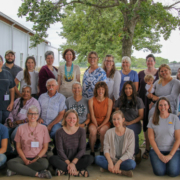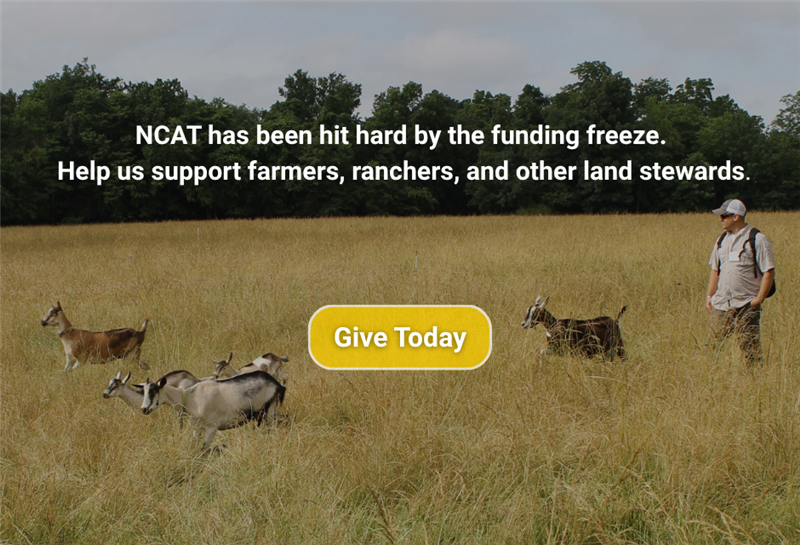Women, Livestock, and the Land—And Other Ways to Make Friends
 Print This Post
Print This Post
By Linda Coffey, NCAT Agriculture Specialist
How would you like to join a group of like-minded farmers from all over your region and learn together? After a few months of interacting online, you could meet up and talk and laugh and do hands-on activities and enjoy the camaraderie and encouragement. What if you could mingle with experienced farmers and learn from their stories and pick up tips?
That’s the experience we had this spring and summer through the Women, Livestock, and the Land (WLL) project. Today I want to tell you a bit about that and encourage you to find similar opportunities to learn with your peers and be mentored (or BE the mentor) to build on successes and learn from challenges. In addition, I know you will make friends!
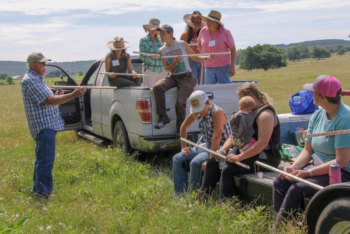
Dr. Ron Morrow shows Arkansas attendees how to use a grazing stick. Photo: Robyn Metzger, NCAT
WLL is an NCAT project, funded by Southern SARE. The purpose of the project is to help women who are beginning pasture-based livestock enterprises learn about managing their land and livestock, using soil-health principles, regenerative grazing, and low-stress livestock handling. Because we know that it’s not just the farm but also the people on the farm and the related businesses and customers that are important, we spent time thinking about goal setting and about marketing, processing, and business planning.
To support the learning, we had modules on Teachable. A lesson learned there is that the curriculum was overwhelming! We are condensing it and removing some of the confusion, and then the course will be available on the ATTRA website for anyone to use. Stay tuned to the Weekly Harvest e-newsletter to learn when it’s available.
We used Zoom meetings to communicate, deliver more content, discuss questions, and share stories. While I know it’s easy to get tired of Zoom, because it was the same group of women invited each week, I looked forward to each gathering. As facilitator, I enjoyed sitting back and listening as the women helped each other. Everyone had something to teach, and all of us had something to learn. I was impressed with the participants and loved their initiative and generosity in sharing. Along with the women who were truly beginners, we had a number who were very experienced and mentored others in the group. This was wonderful!
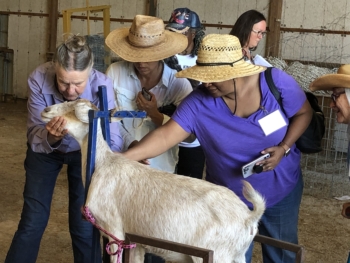
Dr. An Peischel shows Tennessee participants how to assess for anemia using the FAMACHA technique. Photo: Linda Coffey, NCAT
The best part was the in-person training we did in June. Half the cohort met in Cookeville, Tennessee, on the Tennessee Tech campus and enjoyed wonderful speakers (mostly Tennessee Tech graduates) and hands-on activities on the Tech farm. Participants came from Alabama, Florida, Louisiana, Mississippi, South Carolina, Texas, and Tennessee. The rest of the cohort met in Fayetteville, Arkansas, on the University of Arkansas campus. This group came from Florida, Tennessee, Texas, Arkansas, and Oklahoma and enjoyed a farm tour day and then a day in the classroom. At both locations, women farmers came to speak and to teach the hands-on portions, sharing their stories and listening to the cohort. We identified pasture plants, examined soil, made decisions about grazing management, handled animals, including trimming hooves, learning the FAMACHA technique to assess anemia, castrating a goat using a burdizzo, doing body-condition scoring on cattle and sheep and goats, putting up fence, and learning tips from the pros. Women from NRCS, FSA, Farm Credit, RD, and Cooperative Extension came to share programs and information. SCORE volunteers helped with business plans and encouraged women in their goals.
I could talk all day about this experience; it was so much fun and so satisfying to be involved with this cohort. I think that may be important for many of you, too. Here are some ways to get a similar experience:
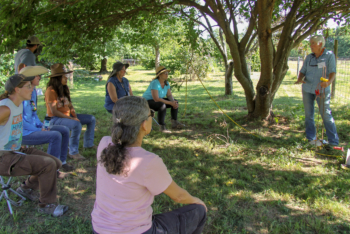
Dr. Tina Cone, DVM, gives the Arkansas participants a demonstration on electric fencing. Photo: Robyn Metzger, NCAT
- Get involved in local networks, through grazing groups, Women in Ag, Cattlemen’s, or any other agricultural organization. There is power in being with others.
- Join the Soil for Water network to be with others who want to improve soil health on their farms. This is another NCAT project, and it offers opportunities to find like-minded individuals, through the Atlas of Regenerative Farms and Ranches (please place your pin on the map!) and through participating in the Soil for Water Forum. If you have questions to ask or stories to share, we want you on the forum! There are also many events, both virtual and in-person, happening throughout the nation. Learn about them and take part; you have something to contribute and something to learn.
- Food Animal Concerns Trust (FACT) has a mentoring program that opens in October. See foodanimalconcernstrust.org and check out their wonderful library of webinars, programs for farmers, and short courses. We enjoy collaborating with FACT and hope to partner with them in the future. Webinars are offered nearly every week through fall and winter and spring, and you are sure to find a topic that is helpful to you.
- If you are a veteran, NCAT’s Armed to Farm program offers a wonderful opportunity to be with other veterans at a five-day class. The Armed to Farm trainings served as the pattern for WLL in-person events—it is just that mix of cohort, classroom, farm tours, and camaraderie that shaped our vision for WLL.
- If you are a woman, know that there are many of us who are farming and would love to include you in the circle. Seek out your “sisters” at local events and look for opportunities to meet others. Instagram and Facebook can help you find a wider community, but there’s no substitute for the people who can invite you over or come to your farm.
- If you are interested in future opportunities, be sure you are subscribed to the Weekly Harvest! That’s how we will circulate applications for programs, let you know about educational events, and point to helpful resources.
I believe in the power of community to make us all stronger and to help us care for the land and each other. I do hope you will find a way to participate! If you know of a program that serves women farmers, please email me at lindac@ncat.org. I am compiling a list to share on the ATTRA website so that women all over the country can find programs and organizations that will support them in their journey. Thank you!
Related NCAT Resources:
Voices in the Field has many episodes that features many women farmers. See, for example:
Other Resources:
Kivirist, Lisa. 2016. Soil Sisters: A Toolkit for Women Farmers. New Society Publishers.
Women, Food, and Ag Network (WFAN)
This publication is produced by the National Center for Appropriate Technology through the ATTRA Sustainable Agriculture program, under a cooperative agreement with USDA Rural Development. ATTRA.NCAT.ORG.

